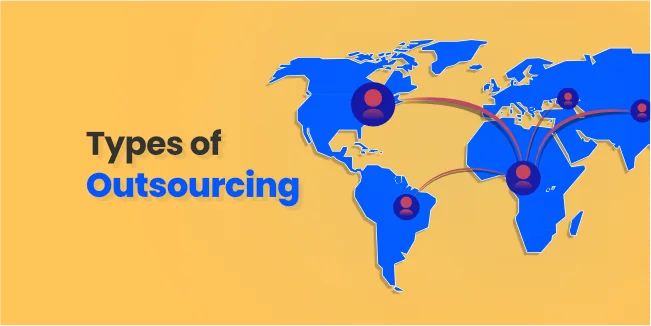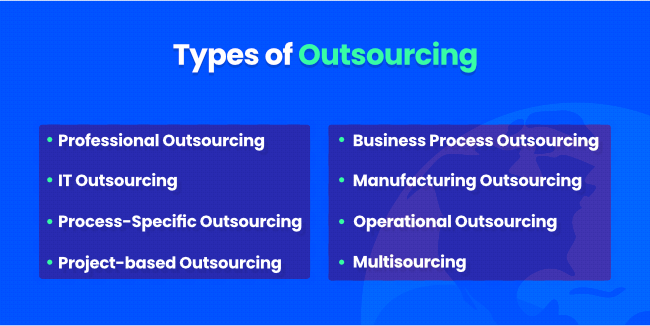Types of Outsourcing

When you start interested in software or mobile application development, you quickly realize that many companies outsource this type of project. Thanks to this, they save money and hand projects over to specialists with appropriate knowledge and experience. At the same time, they focus on other vital processes and tasks for their company.
Of course, the key to success is a thorough understanding of the idea and benefits of outsourcing because only then will you be sure that your decision to outsource is good. The next step is to choose an outsourcing destination and find a trusted software development partner. As the best product development company based among others in Poland, we encourage you to read the article "Why Choose Outsourcing to Poland?". Polish developers are among the best in the world, and at the same time, they are competitively priced. So it is not surprising that many Polish companies provide outsourcing services. But before you start outsourcing your project, find out what the types of outsourcing are so that you can consciously choose the one that will be perfect for the needs of your project.
What is Outsourcing?
The name outsourcing comes from the English language and is an abbreviation of three words: outside-resource-using. It means using external sources. Outsourcing is the transfer of tasks, functions, projects, and processes to an external company. It is, of course, the simplest definition, but it is worth remembering that outsourcing has different faces - from simple projects that improve business processes, increase the company's competitiveness, reduce costs and simply make life easier to highly complex projects that can last for months or years.
Many projects are now outsourced to external specialized service providers. Outsourcing creates an entirely new kind of bond between companies. It is not just a supplier-recipient relationship but a partnership arrangement in which both parties are supposed to win.
Some argue that the idea of outsourcing was best explained by Henry Ford, who said: "If there's something we can't do more efficiently, cheaper, and better than our competitors, there's no point in doing it; we should hire someone who can do the job who can do it better.
Types of Outsourcing
Outsourcing can improve the operation of your company without the need to hire additional employees. However, it is worth noting that there are different types of outsourcing depending on the needs of the business. To choose the appropriate type of outsourcing that will perfectly meet your business needs, it is necessary to understand the different types of outsourcing. Only this will guarantee you make the right decision.

Professional outsourcing means a given task is performed by a professional with the appropriate experience and the required licenses. Professional outsourcing covers specialized services, legal, accounting, purchasing, administrative, and other issues.
The use of professional outsourcing reduces costs, as there is no need to recruit and employ a professional permanently. In addition, thanks to this solution, you have access to an unlimited talent pool. You must also pay only for a specific service; you are not interested in the equipment, office, or materials.
An excellent example of professional outsourcing is software development. If you want to create a mobile application, but you do not have a programmer with the appropriate experience in your team, then by using outsourcing, you can hire the right professional to perform this task.
-
Business Process Outsourcing
Business process outsourcing (BPO) is the most popular type of outsourcing. As the name suggests, in this case, you employ a third-party service provider that handles business processes.
It depends only on you and the organization of your company what these processes will be. These can be administrative tasks, customer contacts, or correspondence handling. It can be more specialized areas like a marketing campaign or technical support.
Of course, the main reason why companies use this type of outsourcing is to save money. Thanks to BPO, you do not have to hire additional employees, train them or organize the workspace. All this is in the hands of outsourcing companies that specialize in it.
Moreover, thanks to BPO, companies can achieve certain flexibility in performing their critical functions. This way, they can improve their speed and efficiency. So it's no surprise that business operations outsourcing is so popular.
IT outsourcing concerns contracting services and resources related to digital technologies and products.
For many years, its popularity has been growing dynamically because almost every company - from a startup to a giant corporation - has specific IT needs. In addition, there has been a huge technological development, such as artificial intelligence, machine learning, cloud computing, and robotic process automation.
With IT outsourcing, you can get support in everything from infrastructure to application development. Moreover, you gain access to a developer or development team with the tools to start your project immediately. An outsourcing company deals with creating a specific software/project for you, and you can focus on other critical tasks for your company.
-
Manufacturing Outsourcing

Outsourcing manufacturing can provide many benefits if your business designs and manufactures physical products. An external service provider can produce your goods at a lower price compared to domestic production. Local production is often too expensive, resulting in a higher final product price.
That is why even the most prominent companies, such as Apple, Ikea, and H&M, decide to outsource production. Outsourcing production means you do not have to worry about hiring additional employees, infrastructure, and equipment.
This type of outsourcing is usually offshore outsourcing, i.e., when the company providing outsourcing services is located on another continent. For example, fashion companies based in Europe outsource the production of their clothes to factories in Asia. However, it is worth noting that offshore outsourcing also applies to software development. The Covid 19 epidemic has shown that to create a great mobile application, you do not need to use the services of a supplier in the same city, country, or even continent.
-
Process-Specific Outsourcing
Process-Specific Outsourcing consists in commissioning an external service provider with a task in which it specializes. For example, a retail company may contract a specific company for delivery services, e.g., throughout Europe. Such nearshore outsourcing is characterized by a highly detailed agreement that includes a delivery schedule or a precise method of calculating the cost of the service.
- Knowledge process outsourcing (KPO) - aims to improve products through research and data analysis.
- Recruitment process outsourcing (RPO) - covers all aspects of external recruitment, e.g., publishing job offers, assessing applicants, or creating shortlisting applications.
- Legal process outsourcing (LPO) - covers all aspects of legal regulations, disputes, and contracts.
Process-specific outsourcing provides companies with the means not only to reduce costs but also gives them time to focus more on their core business functions.
While operational outsourcing is most often seen in the manufacturing industry for services like equipment repair, service companies can also take advantage of it for things such as landscaping and delivery.
Specialists distinguish two basic types of outsourcing - full and selective, which differ in the scope of entrusted tasks. In the case of selective outsourcing, the client decides which areas to cover with the contract, while in the case of full outsourcing (which is operational outsourcing), the client delegates one full area to be handled.
-
Project-based Outsourcing
Project-based outsourcing involves commissioning an external company for a given project. It can be a project already at a particular implementation stage (because you lacked the human resources to implement it) or a project from scratch. Project-based outsourcing generates savings by reducing the time needed to complete a project. In addition, if you do not have the right experts on your team, you can get help from external specialists. Another advantage of project outsourcing is that you don't have to put effort into training someone to work on a given project. Furthermore, entrusting specialists to handle your project will result in faster implementation time and high quality.

Multisourcing provides a combination of IT functions and other business functions. It combines the results of outsourcing from dedicated specialized companies to create a finished, fantastic product. Multisourcing creates best-in-class teams to achieve business goals. It is usually more suitable for large companies that want to outsource different operations and IT infrastructure to various vendors. However, multisourcing is also a good option for any company that wants access to the best specialists and is looking for a performance-based approach. It is worth noting that this type of outsourcing requires the company to have a comprehensive strategy and a network of management and relationships.
Summary
More and more companies are using outsourcing. The main reason for it is undoubtedly the issue of costs, but also maximizing the efficiency and productivity of work on a given project. It is also essential to share the risk between the ordering party and the outsourcing company, which is an additional guarantee. In the case of outsourcing, there are no omissions or inaccuracies. Each participant in the process knows exactly what his tasks are. As an offshore outsourcing company, we know that outsourcing allows companies to focus on other vital goals and tasks, contributing to their development.
If you would like to talk about outsourcing with our specialists, make an appointment for a free consultation at a convenient time. We have been implementing outsourcing projects for several years and are happy to share our experience.